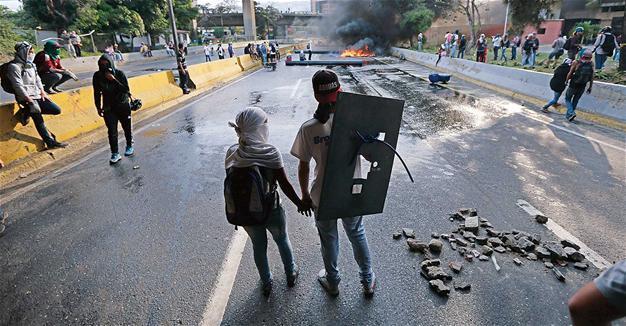UN chief calls for ‘all possible efforts’ to ease Venezuela crisis
CARACAS

U.N. Secretary General Antonio Guterres has urged Venezuela’s authorities to make “all possible efforts” to ease tensions and prevent further violence after two opposition leaders were sent back to prison, as the European Union also reacted against the move.
Guterres “has taken note” of the decision to revoke the house arrest for Leopoldo Lopez and Caracas mayor Antonio Ledezma who were returned to jail, said U.N. spokesman Stephane Dujarric on Aug. 1.
“In this critical moment for the future of the country, the secretary-general urges all Venezuelans, particularly those representing the powers of the state, to make all possible efforts to lower tensions, prevent further violence and loss of life, as well as find avenues for political dialogue,” he added.
Venezuela’s Supreme Court said in a statement that Lopez and Ledezma had violated the terms of their house arrest and that they had a plan to flee the country, claims that lawyers representing the pair denied.
The decision came before a new assembly elected on July 31 was due to take office with the task of rewriting the constitution, a plan that the opposition maintains will allow a slide toward authoritarianism.
The U.N. chief renewed his appeal for urgent political talks and said he supports regional mediation efforts along with those of international facilitators.
The U.N.’s human rights chief also said Aug. 1 that he was “deeply concerned” by the re-arrests.
“I am deeply concerned that opposition leaders Leopoldo Lopez and Antonio Ledezma have again been taken into custody by Venezuelan authorities,” the UN High Commissioner for Human Rights, Zeid Ra’ad Al Hussein, said in a statement.
The EU also criticized the arrest of the opposition leaders, saying it was a “step in the wrong direction.”
The head of the European Parliament separately called for the bloc to look at sanctions against President Nicolas Maduro and his aides over the developments in the oil-rich South American nation.
Leopoldo Lopez and Antonio Ledezma, Venezuela’s highest-profile opposition leaders, were both already under house arrest when they were picked up by the Venezuelan intelligence service early on Aug. 1.
“A few weeks ago we had welcomed the transfer of Leopoldo Lopez from his prison into house arrest,” Catherine Ray, a spokeswoman for EU diplomatic chief Federica Mogherini, told a daily briefing when asked about the detention of the two men.
“We heard the news today and we believe it’s clearly a step in the wrong direction. We expect more information from the Venezuelan authorities on their situation which is still unclear.”
The EU said on July 31 that it had “grave doubts” about recognizing the vote, and on Aug. 1 it again urged the government in Caracas to end a four-month crackdown on protests that has left more than 120 people dead.
“We keep calling on the government of Venezuela to work towards urgent confidence-building measures aimed at de-escalating the tensions and fostering better conditions for resuming efforts towards a peaceful negotiated solution,” said Ray.
European Parliament chief Antonio Tajani said he had written a letter calling for action to Donald Tusk, head of the European Council which represents the 28 member states, and European Commission chief Jean-Claude Juncker.
Venezuelan soldiers are increasingly weary of the popular backlash against their role in quelling anti-government protests and all eyes are on the military to see if it will remain loyal to Maduro.
Nearly five months of demonstrations failed to stop Maduro carrying out a weekend vote for a Constitutional Assembly that opponents say will cement his dictatorship in the OPEC nation.
 U.N. Secretary General Antonio Guterres has urged Venezuela’s authorities to make “all possible efforts” to ease tensions and prevent further violence after two opposition leaders were sent back to prison, as the European Union also reacted against the move.
U.N. Secretary General Antonio Guterres has urged Venezuela’s authorities to make “all possible efforts” to ease tensions and prevent further violence after two opposition leaders were sent back to prison, as the European Union also reacted against the move.